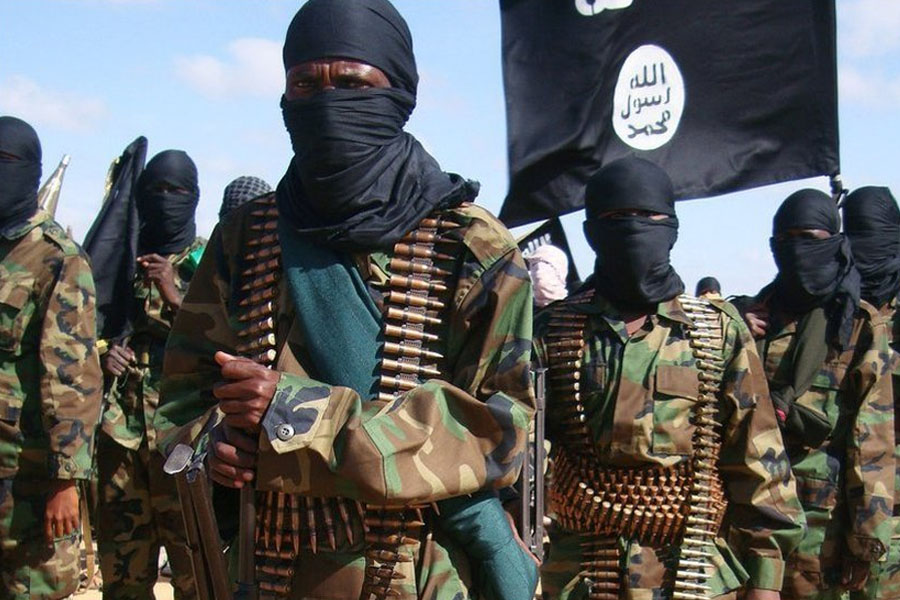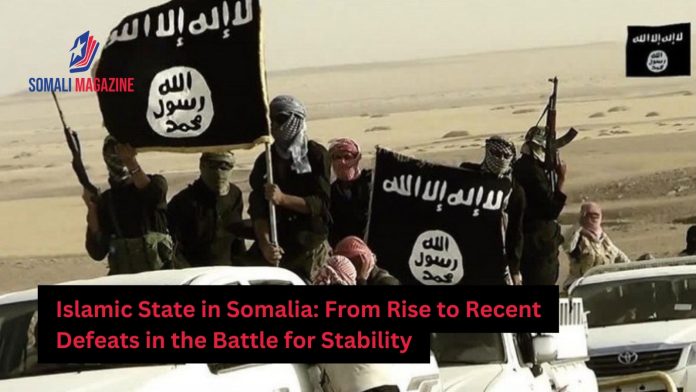Facebook Twitter Instagram Somali Magazine - People's Magazine
The Islamic State in Somalia (ISS), an affiliate of the transnational jihadist group Islamic State (ISIS), has faced significant setbacks in recent months, marking a turning point in its operations. Based in the semi-autonomous Puntland region of northern Somalia, ISS has long been a key player in the country’s insurgency landscape. However, recent battlefield defeats have exposed vulnerabilities within the group, raising questions about its future.
ISS emerged in 2015 as a splinter faction of Al-Shabaab, Somalia’s dominant jihadist group. The breakaway was led by Sheikh Abdulqader Muumin, a former Al-Shabaab cleric who pledged allegiance to ISIS leader Abu Bakr al-Baghdadi. Muumin’s defection was driven by ideological differences and a desire to align with ISIS’s global caliphate vision. The group quickly established a foothold in Puntland, leveraging the region’s rugged terrain and historical ties to smuggling networks.
Puntland’s strategic location, serving as a hub for maritime trade between Somalia, Yemen, and the wider Middle East, provided ISS with a critical advantage. The group exploited these connections to finance its operations, relying on extortion, smuggling, and protection rackets. By 2017, ISS had gained international attention with a suicide bombing at the Juba Hotel in Bosaso, Puntland’s commercial capital. The attack marked a turning point, enabling the group to pressure local businesses into paying protection money, which became its primary source of income.
ISS’s rise was further bolstered by its designation as a full province of ISIS in 2018, granting it access to financial and logistical support from the broader Islamic State network. The group expanded its influence, carrying out assassinations and attacks across central Somalia. At its peak, ISS was responsible for as many as 50 targeted killings in 2017-2018, using violence as a tool to consolidate power and generate revenue.
However, ISS’s fortunes began to wane as Somali and international forces intensified their counterterrorism efforts. The group faced mounting pressure from Puntland’s security forces, supported by U.S. airstrikes and intelligence operations. In February 2025, the Trump administration launched a major offensive targeting ISS strongholds in Puntland’s mountainous regions. The operation, which included precision airstrikes and ground assaults, dealt a significant blow to the group’s leadership and infrastructure.

ISS’s recent defeats have been compounded by internal divisions and competition with Al-Shabaab. The two groups, despite their shared jihadist ideology, have clashed over territory and resources. Al-Shabaab, which views ISS as a rival, has launched attacks against the group, further weakening its position. Analysts suggest that ISS’s reliance on foreign fighters and its limited local support base have also contributed to its decline.
Despite these setbacks, ISS remains a threat. The group continues to operate in Puntland’s remote areas, where state authority is weak. Its ability to adapt and exploit local grievances poses ongoing challenges for Somalia’s security forces. Moreover, ISS’s connections to ISIS’s global network mean that it retains the potential to carry out high-profile attacks.
The international community has emphasized the importance of sustained efforts to counter ISS and other extremist groups in Somalia. This includes addressing the root causes of radicalization, such as poverty, unemployment, and political marginalization. Strengthening governance and promoting economic development in Puntland and other affected regions are seen as critical steps toward achieving long-term stability.
As ISS grapples with its recent defeats, the focus remains on preventing its resurgence and ensuring that Somalia’s progress toward peace and security is not derailed. The group’s trajectory serves as a reminder of the complex and evolving nature of the jihadist threat in the Horn of Africa.

